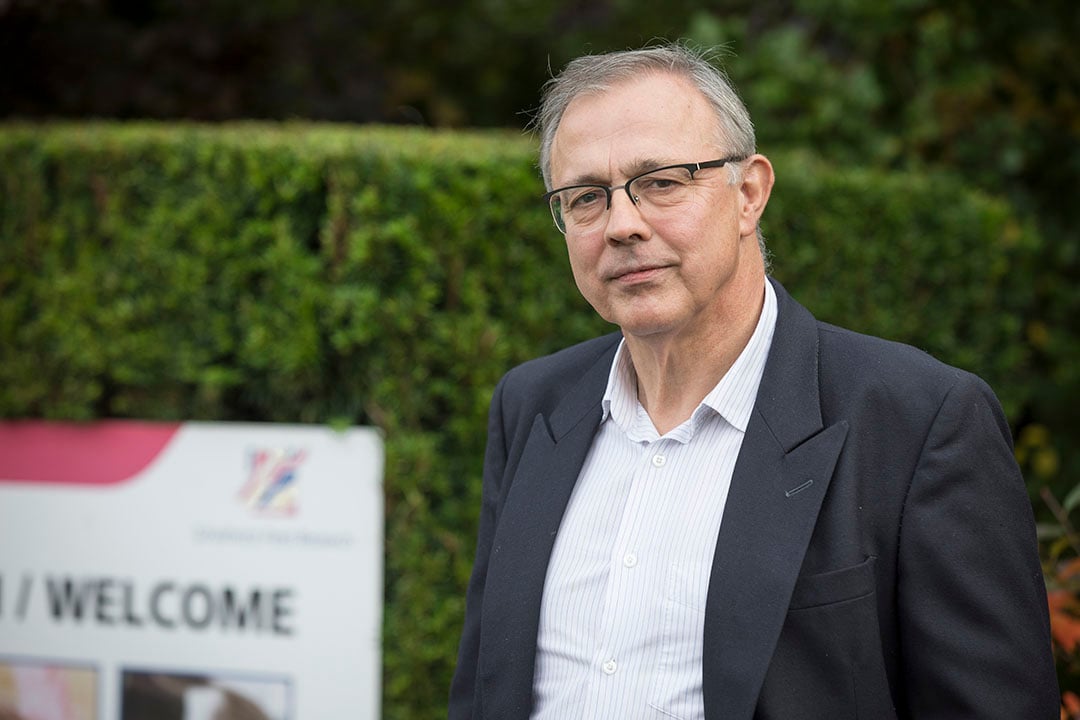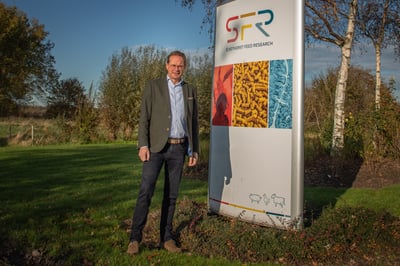Research and Knowledge Transfer
Piet van der Aar:
Piet van der Aar started at De Schothorst in September 1982. "Research and knowledge transfer are truly my passions, and at De Schothorst, these came together beautifully," he says. As director, Van der Aar contributed to the direction of research and the connection between science and practice. Additionally, he played a significant role in the privatization of the organization.
Motivations
After his studies in Wageningen and PhD research in Illinois (USA), Piet returned to the Netherlands. "My PhD research attracted a lot of attention, and in the USA, I co-authored several publications on various animal species because I helped my fellow researchers with statistics. As a result, I received many offers to work in the industry," he recalls. Nevertheless, he chose De Schothorst, where he could remain independent of commercial parties and apply research results directly in practice. Piet never regretted that choice and remained connected to De Schothorst for more than 37 years. He is now retired but still active in the sector as an advisor (through pietnutritie advice) and initiator of the Foundation for the Promotion of Animal Nutrition Studies, which provides scholarships to students specializing in animal nutrition. "Important work, because it is quite challenging to find well-trained personnel in the feed sector," he notes. Piet also writes columns and works as a fact-checker for the AgriFacts Foundation (Staf), critically examining advertisements and educational materials. "This sometimes leads to WOB requests or questions to agencies like the NVWA or the advertising code committee. We identify issues that are later picked up by larger organizations, such as ZLTO."
Passing on Knowledge
Like Schothorst founder Jan Grashuis, Piet often gave lectures for study clubs throughout the Netherlands. "With my slides and projector, I would drive to places like Brabant, to speak in a café or sometimes even a living room about the state of research. Those conversations with the grassroots were my bridge between science and practice." He recalls a lecture where the study club's secretary briefly left and later returned with an old bottle of Beaujolais Nouveau as a thank you. Trained as a cattle researcher, Piet always looked for similarities with other animal species: "Many biological and physiological processes are comparable, and if we discovered something in one species, I wanted to know if it also applied to other species. Often it did, allowing us to translate insights into optimal nutrition for multiple species." His columns often connect nutrition and health, sometimes even drawing parallels to the human sector.
Different Times
When Piet started, there were about eighty cooperative feed companies in the Netherlands. These cooperatives financially contributed to De Schothorst's research, depending on their production volume. Around 1990, quality thinking began to emerge, with more demands from retailers and new quality systems like NEN9002 standards. Mergers in the feed sector led to larger cooperatives, which conducted more feed value research in-house and became more critical of De Schothorst. Smaller companies still saw great value in the research, but this was less true for larger companies. As larger companies paid less per ton of feed, De Schothorst's income declined, necessitating a change in course.
Commercialization
During this turbulent time, there was a re-evaluation of De Schothorst's core values and vision. It became clear that De Schothorst's strength lay in the implementation of animal nutrition knowledge and the translation of science into practice. The organization needed to professionalize and commercialize to survive, which sometimes clashed with the old culture of transparency and independence. But ultimately, it worked out. A business plan was developed to gradually reduce the financial contributions of the cooperatives, with the goal of privatization. Until that point, De Schothorst mainly focused on Dutch customers, but the focus shifted abroad.
Privatization
In 2004, the restructuring led to the privatization of De Schothorst into SFR b.v., with a new governance structure. Piet recalls that several things coincidentally came together at that time: "Someone in our IT department wanted to purchase a software package with a rather expensive maintenance contract. Initially, I had difficulty with that, but it gave me an idea: the concept of maintenance contracts offered opportunities for more stable income." Since then, SFR has offered four-year contracts for products like the feed value matrix, including maintenance, updates, and consultancy. The organization shifted from input-driven to output-driven financing, which was a significant change for Piet. As a director, he was always focused on cost-effectiveness and ensuring that money was well spent for the farmers. The commercial transformation made it necessary to seek new revenue sources and hire new staff, although it was uncertain whether there was long-term perspective for those people.
International Acquisition
Due to the reorganization, Piet took on a new role as research director, allowing him to focus on research and international acquisition and relationship management. His previous international experience came in handy here. Piet traveled extensively to put SFR on the global map, especially in China, where he managed to attract many new customers. Today, fifteen of the world's fifty largest feed producers are SFR clients, something Piet is rightly proud of.
Future
Piet emphasizes the importance of continuity within the organization: "Researchers who have been active in animal nutrition for a long time can better assess the value of older studies and recalculate old results as systems evolve." Continuity in knowledge is essential, but stability should not lead to stagnation. According to Piet, the strength of a healthy organization lies in finding the right balance between stability and flexibility.


Jan Kamphof
The world of livestock and animal nutrition is changing, Kamphof sees it as an opportunity for growth.
Get your free webinar!
SFR proudly celebrates its 90th anniversary, and we want to share this special milestone with our valued clients and the broader community. In honor of our 90 years of dedication, innovation, and service, we are offering everyone the chance to access our extensive knowledge.
For a limited time, you can download one of our exclusive webinars for free. We have curated a selection of 8 engaging webinars, covering various topics, that showcase our expertise and commitment to excellence.



